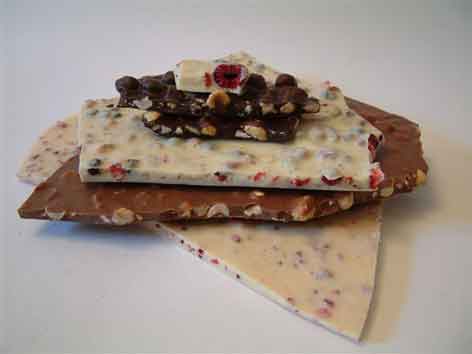7th April 2005

Chocolate guru, Chantal Coady has some advice for the BMA – why not have chocolate on prescription?
The NHS currently spends £7 billion a year on drugs. Many of these prescriptions are given to people who are struggling with problems related to their lifestyle: stress, obesity, and various forms of depression. Some of those are prescribed Prozac or other anti depressants, some are prescribed with going to the gym, or hypnotherapy. Psychotherapy, acupuncture and homeopathy are all prescribed on the NHS – why not chocolate? This is not a joke – but a plea to take chocolate seriously as a substitute for other addictive or harmful drugs. Its true that for some people chocolate is in itself an addiction, but this tends to be the candy bar type chocolate which has very high levels of sugar and fat.
Britain is at last waking up to the fact that obesity levels and childhood diabetes are rising to epidemic levels. It is time for a complete overhaul of the way we eat, drink and exercise. Chocolate is something which crosses the barrier between food, and medicine. It can be taken as a supplement, much like cod liver oil, but better tasting. In Chinese medicine chocolate is considered a strengthening food, and useful for convalescents. Many people feel guilty about eating chocolate, but are happy enough smoke or drink in large quantities. It is important for the medical world to `give people permission` to enjoy the pleasures of chocolate in moderation. Like coffee and wine it is a natural product which changes your emotional state, and is good for you in small amounts.

Health benefits of Real Chocolate
· Chocolate which is high in cocoa solids (60 to 70% or more) is now recognised as having many qualities that are beneficial to health
· Real chocolate is also high in a number of vitamins and minerals such as fluoride which can be good for your teeth and potassium (also found in bananas) which in balanced quantities, help muscles and nerves function correctly, especially the heart. Also contains essential trace elements and nutrients such as iron, calcium, potassium, and vitamins A. B1, C, D, and E.
· Cocoa is also the highest natural source for Magnesium, and also contains calcium, potassium, sodium, iron, zinc, copper chromium and phosphorous.
· It is low in sugar and has a low glycaemic index. This means that replacing desserts with good chocolate can help weight loss and diabetes.
· It is a natural anti depressant.
· The high Magnesium content of Chocolate is beneficial for the Cardiovascular System and hypertension -
· Real chocolate, with a high cocoa content, has been noted to contribute to the prevention of cardiovascular disorders. Chocolate contains cocoa butter which, like olive oil, reduces cholesterol.
· It‘s a pre-menstrual drop in progesterone levels which is responsible for the violent mood swings familiar to so many women (and their families), adding magnesium to a sufferers diet has been proved to increase pre-menstrual progesterone levels, thus alleviating the problem.
· According to research at the University of California Davis, flavenols reduce the chances of high blood pressure and deep vein thrombosis. A 50g bar of chocolate contains the same concentration of flavenols as two glasses of red wine or 6 apples. The benefits can be as great as those of aspirin, cocoa works in the same way, by inhibiting platelet function.
· Commercial chocolate can contain such low amounts of cocoa solids and higher sugar content. Excess sugar tends to be addictive. Shortly after eating it, you feel great, consumed by a surge of energy, followed by a low when the sugar rush runs out. So, if you are a lover of newsagent chocolate and feel the need for a "chocolate lift", it is likely to be the sugar to which you are addicted and not the chocolate.
· A true chocolate ‘addiction‘ is based on cocoa, which contains naturally occurring chemicals like theobromine and phenylethyalanine which the brain reproduces when we get excited by falling or being in love.